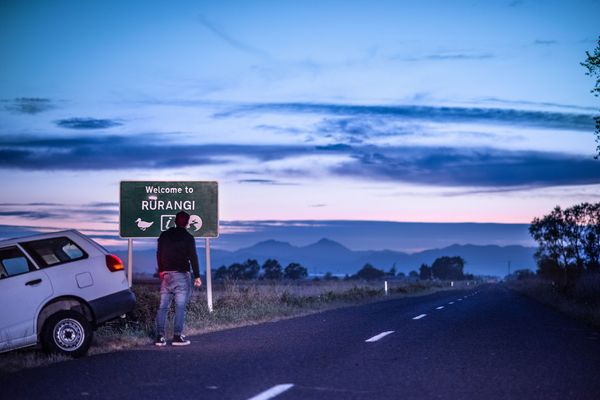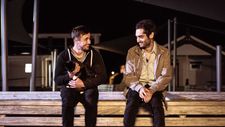 |
| Heading home to Rurangi |
Rurangi, due to reach UK cinemas on Friday 25 February, is the story of burnt out New Zealand/Aotearoan trans activist Caz (Elz Carrad) who returns to his hometown and reconnects with his former life. Exploring his relationship with his father, who is campaigning against incursion by Big Dairy, and his ex-boyfriend, who doesn’t know about his transition, it takes on issues around masculinity, race and community responsibility. I interviewed director Max Currie, who was sitting in front of a bright window drinking his morning cup of tea as I sat in my darkened study with an evening cup of cocoa on what was technically the previous day – one of the oddities of conversing with people on the other side of the world.
We reflect on the fact that I’m probably part of the film’s natural audience – something which can make it tricky, as a critic, to figure out how well a film is going to communicate to a more general audience – but something I’m interested in is the way in which it differs from most past films in terms of how it presents trans experiences to that general audience. It’s not about the process of transition, it’s not all about coming out, it isn’t tragic and it centres on somebody for whom being trans is only one aspect of life. This, Max tells me, is part of what attracted him to the project, and it was non-negotiable as far as writer Cole Meyers was concerned.
 |
| Elz Carrad and Arlo Green in Rurangi |
“That's definitely music to my ears to hear that you can recognise that in the film,” he says, “because that's certainly been my experience with gender diverse and non-binary audiences. And part of our process in terms of having an intersectional gender diverse and non-binary panel who read early drafts and later drafts and looked at the edit. So along with having a trans writer, there was this constant kind of checking in with the audience. That was by design, this idea that hopefully, gender diverse and non-binary people recognise the voices and experience behind the film and the way that it's made.
“I’m always interested in hearing the small ways in which that comes through, for example, that we didn't deadname Caz, that we found a way not to do that, or that we didn't show the graffiti. It's been really interesting to me, the way in which the audience has been so deeply involved in the creation of this, like stylistic choices, the actual visual way in which we tell the story and where we perhaps pull our punches or find a different way of communicating something. And it's like, a fresh language, right? So that's quite exciting.”
It feels like it's doing something new in cinema that's changing the way that these stories will be told, I suggest.
“Yeah, well, there's definitely an instinct, I think, in directors and writers, to sort of zoom in on the point of most friction. That is definitely part of my conversations with my collaborators. Our first instinct with the graffiti was like, ‘Okay, it's painful like this, let's show it so we understand what the characters are reacting to.’ And actually, we have enough of that shit. We don't need this. We know the kind of thing that it probably said. We didn't need to put yet another kind of transphobic message on our screens.”
Is that approach also about trusting actors to be able to communicate that without us seeing it?
“Definitely. It's partly performance. I think it's also, in a way, knowing and trusting our audience, and definitely a result of the closest collaboration I've ever had with, with Cole, who's also co-producer. And the writer/director relationship wasn't just about the script, it was also about me learning to see through their eyes. There was a lot of things that I needed to test with Cole, in terms of how we showed or didn't show something, and what we wanted to do for a diverse and non-binary audience in particular, and how we wanted them to meet the work.”
It’s also rare, I note, to see anything which focuses on trans masculinity, even as more and more films are made about trans women. He asks me why I think that is and I suggest that it’s partly because of how trans women are sexualised and seen as glamorous and a locus of forbidden attraction; and also that I think it’s generally seen as more mysterious that somebody might want to move from living as a man to living as a woman, because women have lower social status, whereas somebody moving into a more masculine role is perceived as gaining power.
He notes that both Cole and one of the people he spoke to at GLAAD commented that we don’t usually see characters like Caz onscreen, and I say that one of the things I find appealing about it is the opportunity it creates to explore masculinity more generally. That seems particularly pertinent as far as the relationship between Caz and his father is concerned.
“Yeah,” he says. “That's probably the one of the areas of the film that's the most personal for me. Making this film has been a sort of juggle between service to another way of seeing that I don't directly inhabit, and then finding those kind of parallels in my own life. So I'm learning and definitely the relationship between Caz and his father was something that I was drawing on personally from my own background. I love the way you talked about the way that masculinity passed on through generations, and yeah, the problems of masculinity around communication and vulnerability. But also, the power of masculine tenderness which we also see in the hospital scene between the between the two men. I still find that really beautiful.”
 |
| Awhina-Rose Ashby in Rurangi |
Caz seems to be still looking for masculine role models, I suggest, and his father's an important part of that, but he's also running against that to an extent, like a lot of young men who don't want to become their fathers but are trying to find a way of understanding themselves.
“Yeah, yeah. Well, I think we're always trying to understand ourselves. And it's interesting, why Caz, In this moment, while there's this time of crisis, why he's drawn back to Rurangi. I think some of the time the audience is ahead of Caz. And, yeah, that is, I guess, the spine of the movie, but it's one version of masculinity, and with this character, you talk about passing privilege, right? And this is just one trans story. And I'm really aware, in terms of the audience discussions we’ve had around Caz, that in a lot of ways you've got to go away, transition, and come back fully formed. And some of the discussion we've had is about the very different experience of doing this within families, within communities, within your social groups, and the sort of challenges that come with that.”
I’m also interested in the way that the film parallels this passing experience with the idea of passing as white and the issues around then who counts as Maori enough.
“That was the attempt, in a way, at saying like, these ideas, or these feelings, or these experiences, are not unique or specific to trans people. Let's look at it another kind of context for identity, and we see the same sort of challenges. And in some ways, if we think of our broader audience, it's possible that stories of identity around race are more relatable and more accessible to some people. Certainly something I hope that perhaps people will come away from the film, was this ability to go ‘Oh, okay, here's something that perhaps I understand in stories about race, and that gives me a wider context for understanding trans people and their journey.’”
We discuss how the issues around race also relate to the film’s focus on land issues and who owns the rights to the land. For Max, this is important in part because of how it allows for a broader view of the characters.
“For trans people, there's these bigger, richer, more complex things that people are part of and care about, beyond gender, as a part of their life, just like my sexuality and gender, it's very small part of my wider, richer life. And it's interesting, like, all the filmmaking, including the conversations that I have with trans people with non-binary people, there's a real, mature interest in power, and how unfair it is – the conversations I have with trans people, particularly about power, exploitation and social justice. I think when you're being at the rough end of the pineapple in so many ways, just to survive, you always have to really understand how these systems and society discriminate and how unfair they are. And so that, in some ways, seems to carry forward into the spirit of the film, this real examination of unfairness if you like, and what's required to survive it, withstand it, subvert it, transform it, transcend it. The film has now become a series, and those are some of the things that we get to explore in a broader, wider way.”
Alongside that, I note, there’s another interesting aspect of the film that I'd like to talk about, and that's the relationship between Caz and his ex-boyfriend, and the complexity of attraction and gender that’s explored around that. Film tends to simplify things in order to fit people into stories in convenient ways, so we don't see many people who are outside of comfortable sort of gay or straight boxes. Even bisexuality tends to be codified at a very neat way in order to make stories work, and this is something much more complicated.
“I think, first, I was perhaps consciously resisting the neatness of things, okay. Like, this doesn't have to be neat and tidy. And I think, again, it's also really trusting the actors, because I work in a way that, you know, I do like to come off the page. And I did a lot of improvising scenarios and backstory with the actors as a way of rehearsing. The final product here was also a big result of what the actors brought, and we wrote and changed things as they explored these characters. And so I think this is also partly the choices that Arlo Green, the actor who plays Jem, made as he dug into the attraction, the backstory of having dated Caz before Caz left Rurangi. So that was a lot of what Arlo brought to the dynamic in the relationship, and then the same thing for Elz. And yeah, it's also a sort of decision.
 |
| Rurangi |
“There's almost pressure, I think, when you're creating a narrative or film, to wrap everything up, to give things a point. And we didn't want to do that with Caz and Jem. We see the love, we see the attraction, we see the fear, we see the complexity, and that all sits there and different parts of that come to the surface sometimes. And yeah, that for me creates a really richly depicted relationship between two people, and I love that complexity.”
I suggest that as the strands come together towards the end, it seems to be about beginnings rather than bringing things to a neat conclusion.
“Yeah, yeah. I think that's partly what's interesting here. We've created this film but, as I'm sure you're aware, it started life as an episodic story. And so, yeah, I do feel like in some ways, the film ends somewhat abruptly, and that's partly a result of that. We very much want these stories and characters to go on and continue. I feel like we're just getting started with these characters and the story.”
How does he feel about how the film has done internationally?
“It does feel like it just keeps hitting above its weight,” he says. “The financial expectation that came with it was a very low bar. This was web series money. This was funded under a sort of diversity scheme. And it's surpassed everyone's expectations. We always knew it was really special. And certainly in New Zealand, part of the work of being a filmmaker is understanding the box ticking that goes with new finding finance, and then being able to deliver on that, but also to have a kind of a greater vision for what something can be.
“It's thrilling that this is platforms so much new gender diverse and non-binary talent. Elz has been amazing. He’s never acted in anything before, and now he's nominated for Best Actor at the New Zealand's film and TV awards. And, yeah, the way the film is travelling, and it's just wonderful. The only regret is that we can't go with it in this pandemic worlds. It would have been really lovely for us to accompany the film as it reaches people.”
This kind of success is a big deal in a small country, he says, and I tell him that I can relate to that, as Scotland is a similar size. He’s excited by the way that the film has helped people from diverse backgrounds to jump start their careers, and by what that makes possible in the future. He’s working on projects with non-binary and queer Maori people, and he’s also involved with a separate German/New Zealand co-production about love and language barriers.
Rurangi opened in the UK on Friday 25 February.





















